'PASSION' COMPARED WITH 'TWIXT'
BRAD STEVENS: "IDENTITY, SEXUALITY & MORALITY HAVE ALL BECOME PROVISIONAL" Sight & Sound's Brad Stevens
Sight & Sound's Brad Stevens reviews
Brian De Palma's
Passion, linking it with
Francis Ford Coppola's
Twixt, both of which have been recently released in the U.K. as straight-to-video titles. "For many years," Stevens states, "the phrase ‘straight to video’ had the force of an insult, generally being used to describe ‘B’ movies not good enough for theatrical distribution. Yet, at least in the UK, ‘straight to video’ initially meant something quite different, often referring to films considered too quirky for mainstream audiences." Stevens writes that as DVD took over from VHS, in the U.K., more and more of those unique films not getting theatrical distribution would simply receieve "no UK distribution whatsoever."
Stevens continues, "In recent months, however, the situation appears to have changed, with two works by important American directors – Francis Ford Coppola’s
Twixt (2011) and Brian De Palma’s
Passion (2013) – making their UK debuts on DVD (thanks to Metrodome). The fortuitous juxtaposition of these titles underlines how much they have in common, both being concerned with the ways in which modern communications technology has obscured the distinction between reality and fantasy. Their endings, in which the protagonists appear to dream or imagine their own murders before awaking into a reality which may itself be a fantasy, are strikingly similar.
"I have written about Coppola’s film in more detail for Video Watchdog but De Palma’s is perhaps the more distinguished of the pair, if only because that cynicism which so frequently permeates his work ends up giving Passion greater thematic coherence – something which, for better and worse, is lacking from Twixt, Coppola’s optimism preventing him taking De Palma’s final leap into despair."
Stevens somewhat echoes Sara Freeman's essay on Passion, in which she suggests that the advertising businesswomen involved in the film's drama are each "living inside her very own Facebook profile or twitter account." But Stevens seems to delve even further into this idea-- here is another excerpt:
-----------------------De Palma has of course been dealing with the impact of imagery on both those who create it and those who consume it throughout his career. Hi, Mom! (1969) in particular now seems remarkably prescient in its portrait of a society wherein we record our everyday activities and end up staging them for the camera’s benefit. Passion updates this concern to the era of Skype, email and mobile phones, all of which De Palma sees as providing new opportunities for deception (including self-deception) and misrepresentation. The plot involves a rivalry between two women working for a German advertising agency, the seemingly introverted Isabelle (Noomi Rapace) and her extrovert boss Christine (Rachel McAdams). Although the film is told mostly from Isabelle’s viewpoint, we learn almost nothing about her. Her sexuality, friendships, familial relationships, past life and nationality are all mysterious; as Christine tells her, “I don’t even know where you’re from or what you want.” Isabelle is the product of a social-media culture, creating herself through various manipulations and technological transactions, existing only to the extent that desires can be projected onto her by the people she encounters, ultimately disappearing into a state of uncertainty wherein everything is (or might as well be) a dream.
Stylistically, the film is divided into two parts. The first half is lit and framed like an episode of a television series about backstabbing among the jetset (Dallas, perhaps) while the second half is much lusher visually, with the kind of excessive mise en scène typical of this director. It is here that Isabelle abandons her former passivity and takes decisive action, successfully carrying out a complex scheme to destroy Christine. Essentially, she retreats into an ‘online’ world in which her fantasies can be realised without fear of exposure, and De Palma implies that this entire section is Isabelle’s dream.
But the earlier scenes take place in a world which is just as ‘unreal’, just as heavily marked by wish-fulfilment fantasies and stylish surfaces: Christine claims to have both a twin sister and a childhood trauma but may have invented both, and at times is so harshly lit that her face appears to be as white as the mask of herself she makes her lovers wear. This mask is eventually donned by Isabelle (who thus ‘becomes’ Christine) during a murder scene that might be a fantasy (but also might not). In a world where so many of our relationships are conducted via the internet, it makes little difference whether we are on or offline, awake or dreaming, guilty or innocent. Identity, sexuality and morality have all become provisional, subject to constant revision. As with Mitt Romney’s Etch A Sketch presidential campaign, it is always possible to hit the reset button and start again.
Monte Hellman’s Road to Nowhere (2010) shares many of these concerns and so far has not received any UK exposure. A few months ago, I wrote about a group of 80s films that critiqued American cinema’s dominant trends. These recent works by De Palma, Coppola and Hellman suggest the emergence of a new oppositional movement, one which challenges those hermetic CGI entertainments wherein the erasure of physical reality serves as a guarantee that we can leave our troubles at the door, that nothing will be permitted to disturb our involvement in corporate-controlled fantasies.
-----------------------------(
Thanks to Rado!)
 According to Broadway World Cleveland, Lawrence D. Cohen is so impressed by the "rave reviews and vivid photographs" for Beck Center and Baldwin Wallace Music Theatre Program's production of Carrie the musical, that he will be in attendance Friday night, March 7, and will share his experience with both the movie and the stage show during a discussion following the performance. This will be the final weekend for the production, which plays at 8pm Friday, 8pm Saturday, and 3pm Sunday. The article states that "Lawrence D. Cohen and composer Michael Gore reached out to Director Victoria Bussert with a congratulatory note and accolades for her creativity in capturing some of the technical challenges the show presents."
According to Broadway World Cleveland, Lawrence D. Cohen is so impressed by the "rave reviews and vivid photographs" for Beck Center and Baldwin Wallace Music Theatre Program's production of Carrie the musical, that he will be in attendance Friday night, March 7, and will share his experience with both the movie and the stage show during a discussion following the performance. This will be the final weekend for the production, which plays at 8pm Friday, 8pm Saturday, and 3pm Sunday. The article states that "Lawrence D. Cohen and composer Michael Gore reached out to Director Victoria Bussert with a congratulatory note and accolades for her creativity in capturing some of the technical challenges the show presents."




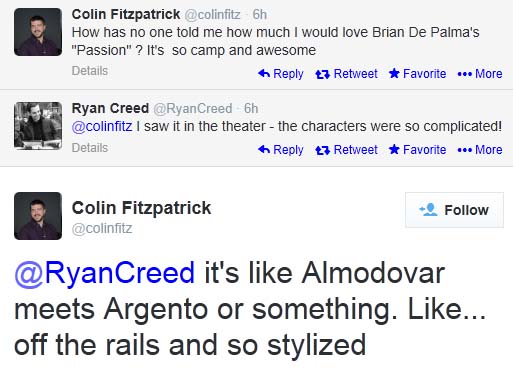
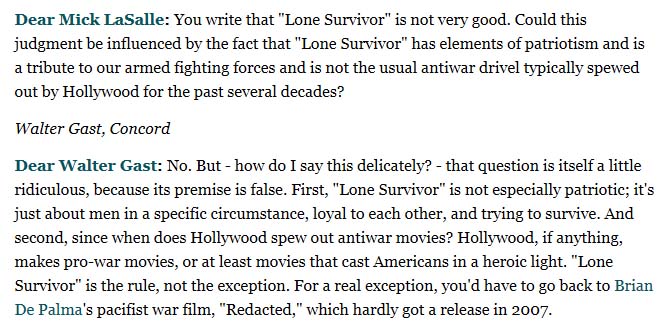
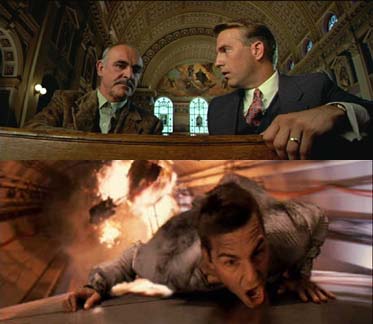 The theme of last night's Oscars telecast was "Heroes", and included time-filler montages of all kinds of movie heroes. One montage, introduced by Sally Field, included a clip of Ness and Malone talking in the church from Brian De Palma's The Untouchables. In another montage, introduced by Chris Evans, a quick-clip from De Palma's Mission: Impossible showed Ethan Hunt landing on top of the train after blasting himself from the helicopter.
The theme of last night's Oscars telecast was "Heroes", and included time-filler montages of all kinds of movie heroes. One montage, introduced by Sally Field, included a clip of Ness and Malone talking in the church from Brian De Palma's The Untouchables. In another montage, introduced by Chris Evans, a quick-clip from De Palma's Mission: Impossible showed Ethan Hunt landing on top of the train after blasting himself from the helicopter.
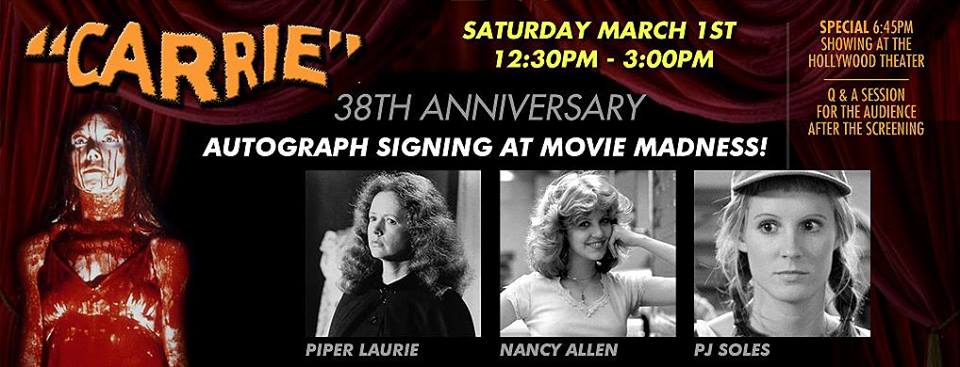

 Brian De Palma's Passion will be included as part of a film series at the
Brian De Palma's Passion will be included as part of a film series at the 
 Giorgio Moroder will introduce a special screening of Brian De Palma's Scarface, for which he composed the score and songs, at the 2014
Giorgio Moroder will introduce a special screening of Brian De Palma's Scarface, for which he composed the score and songs, at the 2014 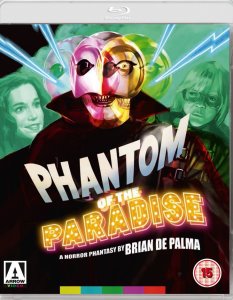 In a review for Arrow's new Blu-ray of Brian De Palma's Phantom Of The Paradise,
In a review for Arrow's new Blu-ray of Brian De Palma's Phantom Of The Paradise,